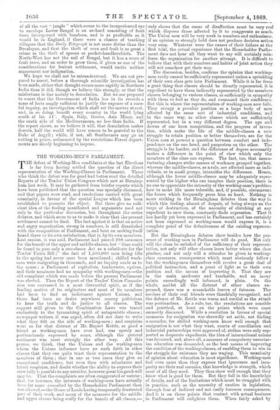THE POLITICAL IMPORTANCE OF TREES.
THEGovernment of India will, we imagine, be very soon compelled to perform one of those acts of high-handed but intelligent and beneficent despotism which are the justifi- cations of its rule. Unless we are greatly mistaken as to the meaning of symptoms which we have watched closely for nearly a quarter of a century, the highest virtue of our rule on that continent is itself introducing a new and most serious evil. We have established and are maintaining throughout India a security for life and property formerly unknown, and that security has been followed by a steady increase in population, the extent of which is still only guessed at, but which will one day be found to be as great as the increase in any race, except only the one which speaks English. Two-thirds of this population lives by cultivating the soil, and the masses of agriculturists as they increase press more and more upon the wild lands, swarm up the hills, pare away the jungle, and, sure of their crop whatever its value, cultivate almost as closely as Chinese. At the same time, the demand for timber throughout India has increased enormously, partly through the wants of the Railways, which almost exceed belief, partly through the requirements of the public works, but most of all through the increased and increasing purchases of the people themselves, who begin to need twice the furniture, beams, and firewood with which they were formerly content. It follows that there is less readiness to sacrifice soil to trees and more readiness to cut trees down, till the peasant comes to regard his wood as his bank of reserve, and meets every pecuniary accident of his life, a bad crop, a wed- ding, or a heavy debt to his usurer, by cutting down his trees. The North-West, it is said, though we vouch for no fact we have not seen,—is slowly becoming stripped and the usual consequence follows, a distinct and visible increase in the proportion of years of drought, and of sudden and disas- trous floods. The trees no longer attract the clouds, the actual quantity of rain diminishes in the plains, the clouds break only on the hills, and the rainfall, instead of fer- tilizing the land, is wasted in rushing floods, which deposit more sand than fructifying soil. The volume of water in the rivers decreases, the level of water in the wells recedes, and the slightest delay or failure in the annual supply is fatal to the crops of the year ; and shouldithappen twice in succession, the distress becomes appalling, becomes, in fact, a great poli- tical disaster, crippling the Treasury, and filling whole regions with a kind of brigandage. A season of this kind occurred lathe North-West, and more especially in Rajpootana, twoyears
ago, and the Government evidently expects another, for it has suspended the preparations for a Durbar which was to have been one of unusual magnificence. Every chief must have brought an army of followers to do honour to the Empress's son, and the risk of moving perhaps a quarter of a million of men across a country thus distressed, and then camping them on one of the few plains sure to be fertile, but sure also to be exhausted by the concourse, was too great to be encountered. The Government, therefore, wisely postponed a somewhat useless ceremony, and is, we hear, warning its feudatories in urgent tones to prepare for the possible disaster.
If the theory of denudation is correct, of which there seems to be little doubt, and if the plains of Northern India are really becoming bare, of which there is considerable evidence, the evil, unless checked, may go very far. We have no wish to speak absolutely upon a subject which requires much more inquiry, but there certainly exists a strong antecedent pro- bability that the stripping of a country is most injurious to its prosperity, and may, under certain circumstances, prove abso- lutely fatal, may, to speak broadly, change it into a useless desert, to be revived, if at all, only by costly works for arti- ficial irrigation. It is nearly certain that the desolation of Numidia, once a granary, now a desert, is due to the wilful destruction of the trees by the barbarians ; that the Babylonian plain has been desolated by the same cause, and that the Punjab was, when we conquered it, rapidly becoming a desert. The trees had been cut by successive devastators, Runjeet Singh himself being among the worst, until the kingdom was as bare as a hand, and Lord Lawrence was compelled to undertake planting as a political duty. The desolation of Judea, once so thoroughly cultivated, is in all probability due to the same cause ; and the Arabs, of all the ancient races the one which best keeps its traditions, so dread it that, for fifteen centuries to spare the trees has been the one " inter- national " law of the tribes, and the relation of Mahommed's conduct in twice breaking that law is always accompanied with an excuse. The French begin to attribute the in- creasing sterility of their southern provinces to the same cause, which is felt, though in a less degree, in Lombardy, and, above all, in Spain, where, if the Times is accurately informed, rapid and systematic felling is destroying all chance of a future for agriculture. No industry can stand up._ against a certainty of "drought," in the tropical sense, that is, of a total loss of crops once in every three years ; and as the process goes on, the proportion will become much greater than that. In each of these instances the remedy lies entirely with the State. It alone can institute inquiries on the neces- sary scale, it alone lives long enough to reap the full benefit of such slow work as planting, it alone has the disinterestedness to abstain from felling the renewed forests, and, above all, it alone has the strength to restrain the pitiless hunger for pennies, for small immediate gains, which is at once the strongest stimulus and the gravest drawback to the petite culture.
In the North-West of India, above all places, the State is splendidly placed to undertake the task. The Government there have at their disposal a thoroughly organized Forest department, having at its head one of those rigidly-trained Prussian savans who, once empowered to commence a reform, have both the patience and the force to carry it fairly through. They have a revenue administration so extensive and so closely compacted that they could, at any moment, obtain reports as to the prospects of every field in any given district. They have a property-right in all waste or uncultivated land, and they have, above all, a settlement which enables them every thirty years to introduce any new conditions they please into the tenure of the soil. Supposing a careful and thorough inquiry to go on for two years, conducted by Dr. Brandis, the Director-General of Forests, and aided by all civil surgeons, revenue officers, and planters throughout the Provinces, and to result in a demonstration of the danger, the Government could almost at once arrest its progress. They could make the planting and maintenance of a certain number of trees the first condition of all tenures, set apart a tenth of all wild land for plantations, exempt all forests from taxation, or rather place a heavy tax on " cleared " land, and line all roads with trees, as is being done in the Punjab. There would be no resistance from the people and no annoyance felt by them. A supreme order of that kind, falling on all alike and carefully explained, will be obeyed as if it came from Heaven, and obedience need not be expensive. There is no reason whatever why the trees should not be fruit trees, which will yield greater profit to their owners when standing than when felled. One third, at least, of all the vast " jungle " which seems to the inexperienced eye to envelope Lower Bengal is an orchard consisting of fruit trees interspersed with bamboos, and is as profitable as it would be in England, if there were a chance of teaching villagers that the Daily Telegraph is not more divine than the Decalogue, and that the theft of corn and fruit is as great a crime as the theft of spoons or pocket-handkerchiefs. The North-West has not the soil of Bengal, but it has a score of fruit trees, and an order to grow them, if given as one of the considerations for lenient settlement, would excite neither amazement nor indignation.
We hope we shall not be misunderstood. We are not pre- pared to assert, before a thorough scientific investigation has been made, either that drought recurs more rapidly in Northern India than it did, though we believe this strongly, or that the misfortune is due mainly to denudation. But we are prepared to assert that the Government of India has in its records a mass of facts amply sufficient to justify the expense of a care- ful inquiry, an investigation which shall set the matter at rest, and, in so doing, benefit every country in the world lying south of lat. 44°. Spain, Italy, Greece, Asia Minor, and the south side of the Mediterranean, no less than India. If the report shows, as we believe it will, that denudation makes deserts, half the world will have reason to be grateful to the Duke of Argyll ; while, if not, all Southerners may go on cutting in peace, unharassed by the restrictions Forest depart- ments are slowly beginning to impose.































 Previous page
Previous page